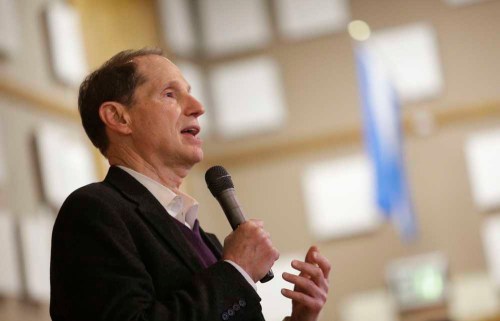Wyden: Look before you leap on repealing internet legal shield
Published 3:00 pm Friday, February 19, 2021

- U.S. Sen. Ron Wyden, D-Ore., speaks at a town hall meeting in Bend in 2018.
WASHINGTON — U.S. Sen. Ron Wyden cautioned critics against being too hasty to repeal the legal shield for information service providers for content posted on their platforms.
Conservative and liberal critics have taken aim at Section 230 of the Communications Decency Act, the 1996 law authored by the Oregon Democrat and Rep. Christopher Cox, then a Republican from California. They argue that it has given too much power to tech giants such as Facebook and Twitter.
But Wyden says the law is not one-sided. He spoke Thursday, Feb. 18, at a Multnomah County virtual meeting that the Town Hall Project live-streamed on Facebook.
“The people who post content are responsible for what they post. Period. That in effect creates something of a shield for the platform, because the poster is personally responsible,” Wyden said in response to a written question read aloud by the moderator, Nathan Williams.
“The sword was that the platforms could do more to moderate what was on their sites, so they could get rid of the slime and the hate and all the horrible stuff.
“Now we all know the platforms have not exactly covered themselves in glory about using the moderation provision; some of them are better than others. But the real issue is … that if we did not have Section 230, things would still be the same without reform. It’s not 230 that is the challenge — it is the First Amendment.” He referred to the federal constitutional guarantee of free speech.
Cox left Congress after 17 years in 2005 to lead the Securities and Exchange Commission during the second term of President George W. Bush.
Just before he left office, President Donald Trump vetoed the $740 billion military authorization bill, partly because it failed to attach a repeal of Section 230. But two-thirds majorities in the Democratic-led House and Republican-led Senate overrode his veto, mostly on other grounds.
“My guess is that the only thing Donald Trump knows about 230 is that it’s between 2 and 3 o’clock,” Wyden said.
Wyden said Trump’s real issue was with Twitter, which first flagged some of his tweets, then suspended his account and finally barred him permanently from the platform — mostly stemming from Trump’s false claims about the outcome of the presidential election.
Wyden said that while there are legitimate questions about the misuse of the platforms, they also have aided social movements such as #MeToo against sexual harassment and abuse of women, and #BlackLivesMatter against police misconduct and other violence against Black people.
“How we go about dealing with it is the key,” Wyden said.
“I want to make sure how we protect constitutionally protected speech. That has always been hugely important to Oregonians. I also want to protect the ability to moderate, because whatever you think about it, this is a tool that can actually be used for good.”
Wyden covered a range of issues during the hourlong virtual meeting, which he has substituted for in-person town halls during the coronavirus pandemic.
He is now chairman for a second time of the Senate Finance Committee, which holds sway over tax and trade issues, Social Security, Medicare and Medicaid, the large federal health insurance programs.
He said his first priority is to advance the relevant parts of President Joe Biden’s $1.9 trillion pandemic recovery plan, including an extension of unemployment benefits, more aid for vaccination and personal protective equipment, and new efforts to reduce child poverty.
Biden proposes to cut the child poverty rate by more than half. A House committee has proposed to do so by increasing the child tax credit from $2,000 per child to $3,000 per child between ages 6 and 17 ($3,600 for each child under age 6), though only for one year. Utah Sen. Mitt Romney, the 2012 Republican presidential nominee, has proposed a still bigger amount, but also to end the Temporary Assistance for Needy Families program and reduce food assistance. Under Romney’s plan, all households with children would get checks, although higher-income families would pay more in taxes; the House plan would set household income limits.
“I will work with anybody on any of these important issues that stick to core principles,” Wyden said. “What we are trying to do with kids is make sure we finally put in place a safety net to deal with child poverty. We’re better than we are in lagging behind all countries in terms of making progress on child poverty.”
Wyden said he’s interested in further expansion of the earned-income tax credit — which Congress passed in 1975 and has seen major increases under Republican and Democratic presidents except Trump — and other aid for low-income workers without children.
But Wyden would not commit to a Medicare-for-all plan that has been advocated by Democratic progressives. Wyden said most of the Democrats on the Finance Committee do want to expand “more Medicare choices,” such as allowing a public option for coverage under the Affordable Care Act, or people to buy into Medicaid or Medicare. More than 1 million Oregonians are covered under Medicaid for low-income people; Medicare is the federal health insurance program for people 65 and older, and some people with disabilities.
His response did not satisfy the questioner, who responded, “What we have is ineffective, unsustainable and not working.”
Wyden did not mention it in his response to that question. But he told someone else that sweeping changes that do not involve the federal budget will be difficult with a 50-50 split in the Senate — Vice President Kamala Harris holds the tie-breaker — and a budget reconciliation procedure that requires 51 votes for approval.
“The rules make it hard to do policy and easier to do spending,” he said.









